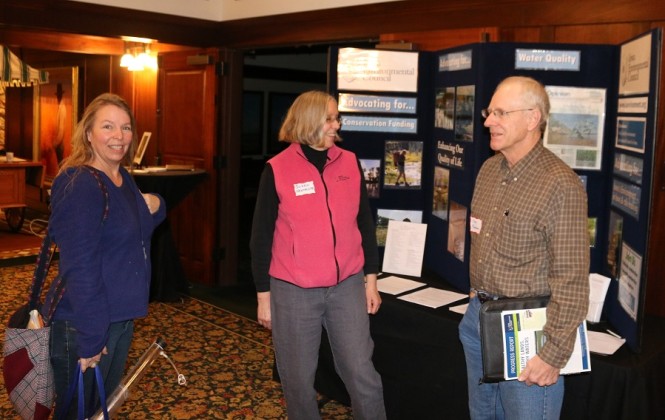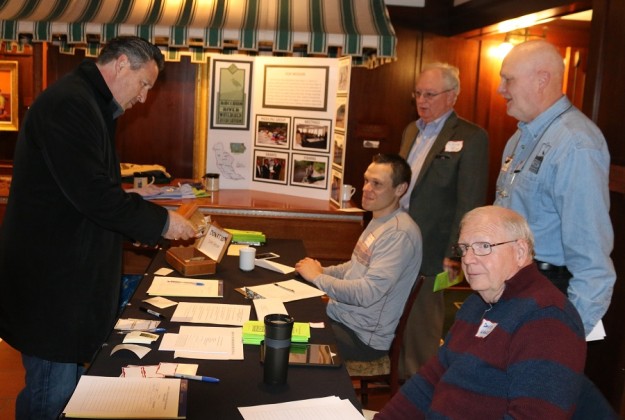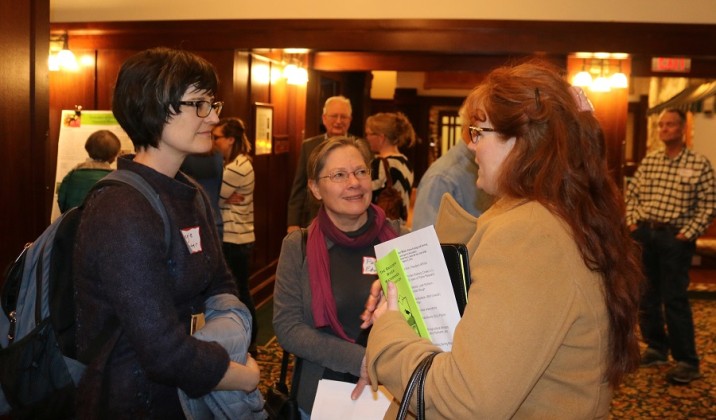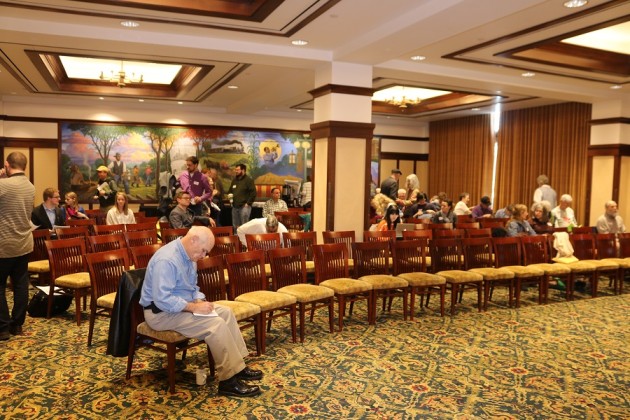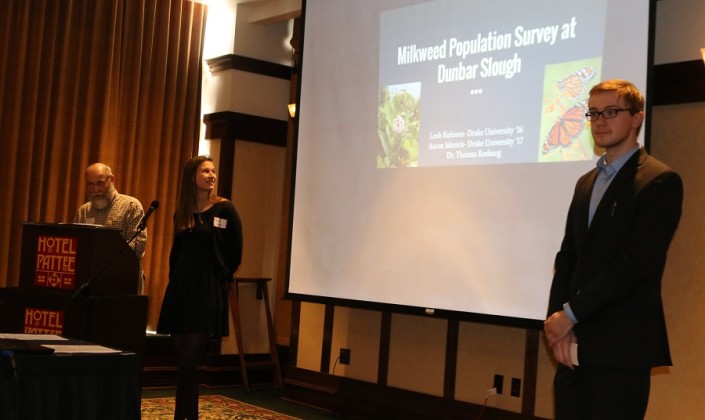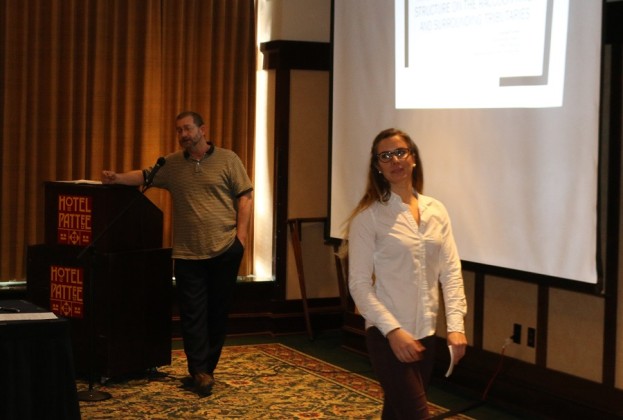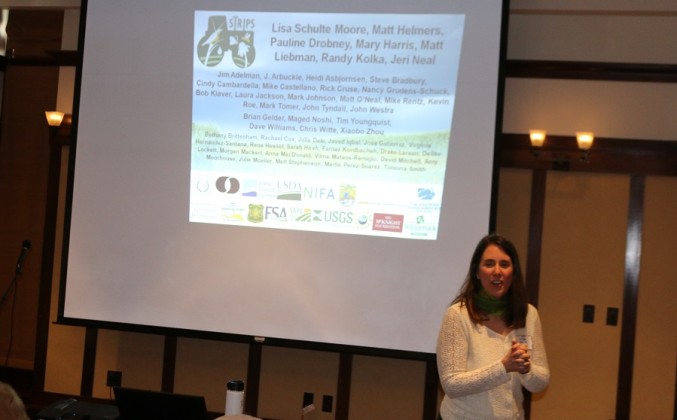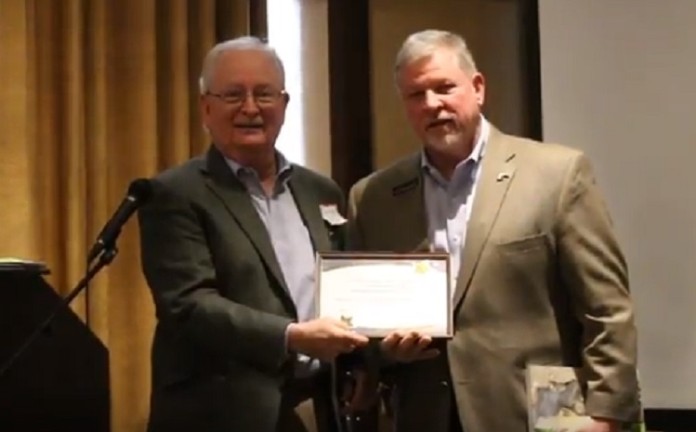
About 100 people attended the Raccoon River Watershed Association (RRWA) annual conference Saturday at the Hotel Pattee in Perry. “Life in the Raccoon River: Prairie Ecology and Farming” was this year’s theme, featuring half-a-dozen sessions on aspects of Raccoon River ecology.
Ackworth Democrat Scott D. Ourth was honored as the RRWA Legislator of the Year in a brief ceremony at the start of the conference. RRWA President Steve Roe presented a plaque to Ourth, who proposed a five-year moratorium on turtle hunting in Iowa from his seat on the Iowa House Natural Resources Committee.
“He fights the battles for us on the hill,” Roe said.
“I was the author of this bill to preserve and protect four species of turtles native to Iowa,” Ourth said. “They’re currently being taken out of the ecosystem at an alarming rate. We’re the only state with no regulation. Six Midwestern states around us do not allow any harvest of turtles. Other states have limited waters, seasons and bag limits. I wanted to put a five-year moratorium on it. That was a bit much for some people, so I have a bill in that fortunately has had some bipartisan cooperation.”
But the bill hit a snag the last week, Ourth said, and now must be resurrected by Wednesday in order to be considered in the current legislative session.
“There are a couple of folks on the other side who don’t seem to realize that killing off mother earth is suicide for the human race,” Ourth said. He advised the RRWA conference goers to contact their representatives and encourage them to support the bill, HF2357.
He also recommended contacting the House leadership directly: Cerro Gordo County Republican Linda Upmeyer, Polk County Republican Chris Hagenow, Harrison County Republican Matt Windschitl, Jackson County Republican Brian Moore and Tama County Republican Dean Fisher.
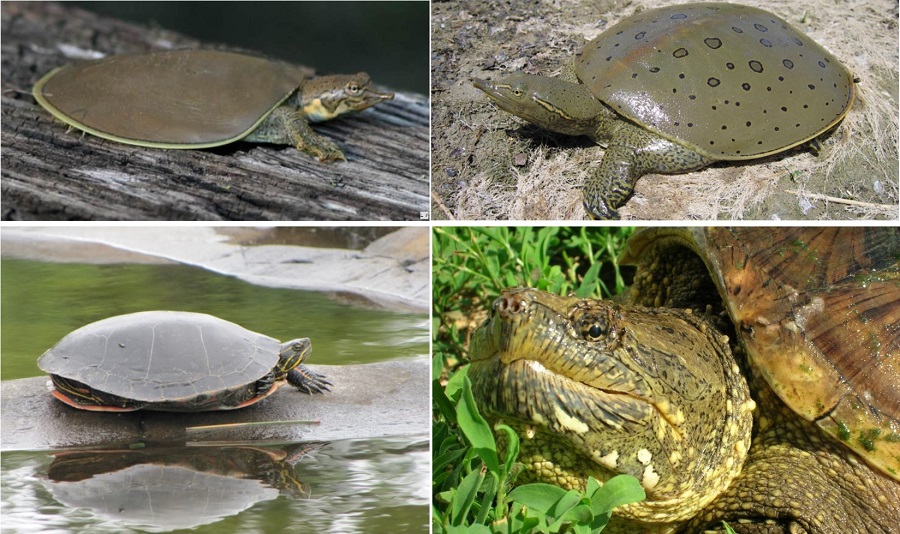
Along with high-quality presenters, the conference attracted a wide variety of agriculture and water quality experts from around Iowa, including Mary Skopec, research geologist with the Iowa DNR and program coordinator with the IOWATER volunteer monitoring program; Susan Heathcote, water program director with the Iowa Environmental Council; and Neil Hamilton, director of the Agricultural Law Center at Drake University, and numerous others.
Drake University Professor of ecology and botany Dr. Thomas Rosburg started the morning session with an in-depth discussion about what he has learned about prairie ecology over the last 40 years. He described an “invisible prairie” forming a latent remnant on pasture lands in southern Iowa and northern Missouri.
Rosburg’s prairie talk was a helpful preparation for Iowa State University Professor of natural resource ecology and management Dr. Lisa Schulte Moore’s review of her research on the benefits of prairie strips. Schulte Moore’s work shows how the strips of restored prairie on row-cropped land can significantly reduce soil erosion and nutrient loss.
Two undergraduate students of Rosburg’s, Leah Robison and Aaron Menick, presented their work on milkweed populations at Dunbar Slough near Scranton. They situated their data in relation to the global decline in the population of monarch butterflies. Monarch larvae eat only milkweed, which agricultural herbicides have greatly reduced in number in Iowa.
The health of insect populations in the Raccoon River has been a subject of RRWA research support for several years, and Drake University undergraduate student Gabrielle Brodeck’s report on her study of benthic macroinvertebrates — tiny insects — in the Raccoon River and its tributary creeks extended research that has been ongoing.
“The RRWA has funded $20,000 of research on the biology of the Raccoon River,” said Mike Delaney, a founding member of the RRWA. “The three years of Drake University research on benthic macroinvertebrates has built one project on the other so that a considerable body of scientific data has been accumulated.”
Brodeck reported the size and diversity of insect populations are greater in the main channel of the Raccoon River than in its tributary creeks, such as Mosquito Creek and Sugar Creek. These finding were contrary to her hypothesis, she said.
A panel of four of Iowa’s leading conservation farmers brought diversity to the conference’s afternoon sessions. Delaney moderated the discussion by the members of the RRWA Agriculture Advisory Committee: Jerry Peckumn, board chair of Iowa Rivers Revival; Craig Fleishman, Minburn sustainable farmer and RRWA board member; Jim Caligiuri, chair of the national agriculture committee of the Izaak Walton League; and Francis Thicke, Fairfield organic farmer and 2010 reform candidate for Iowa Secretary of Agriculture.
The conference ended with photo displays by Ty Smedes and Leland Searles, bringing to the eye the very rich wildlife in the Raccoon basin and providing an aesthetic climax to a very informative day. Searles, a RRWA board member, was pleased with the event.
“I’ve been very satisfied to work with the Board and Officers in planning the Life in the Raccoon conference,” Searles said, “from our venue at the Hotel Pattee to the quality of work from the faculty and students at Drake University and other institutions. We have a dedicated membership of advocates, citizen scientists and professionals with clear goals, the necessary skills and the drive to make changes.”
The RRWA is an all-voluntary, non-profit that does not seek grants or have deep-pocketed funders. The group is “completely self-funded by members,” Delaney said, “so it is unfettered by big money, industry or politics.”








